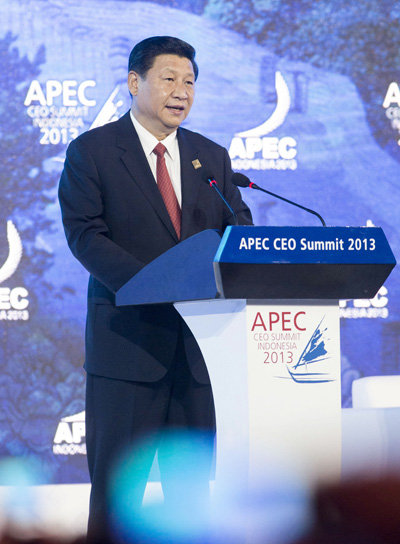Ambitious APEC
APEC leaders agree that a vigorous Asia-Pacific will remain the driver of the world economy
|
 |
|
President Xi Jinping states China's stance on regional economic development on Oct 7,2013 in Bali, Indonesia.[Photo/bjreview.com] |
Amid a slow global economic recovery in recent years, the Asia-Pacific region, consisting of the most dynamic and hopeful economies on the globe, has maintained vigorous economic growth.
Under the theme Resilient Asia-Pacific, Engine of Global Growth, this year's series of Asia-Pacific Economic Cooperation (APEC) meetings were held from October 7-8 on the Indonesian resort island of Bali. Chinese President Xi Jinping participated in the APEC informal economic leaders' meeting, equipped with proposals to boost regional economic ties and assertions that China will continue pursuing economic reform.
China's role in APEC
During the meeting, the Chinese president exchanged views with leaders of APEC members. He called on all regional members to further restructure their economies, oppose trade protectionism, and boost cross-Pacific interconnectivity. Xi also proposed that members increase the openness of their economies, as well as promote policy coordination, common development and the integration of interests in the area.
These proposals will help the region handle current challenges and formulate plans for the future, said Chinese Foreign Minister Wang Yi. Wang believes China's active role will help the region continue serving as an engine for world economic growth.
As the biggest developing country and emerging economy in the world, China's economy and its development plans have been a subject of worldwide concern. In an address at the APEC meeting on October 7, Xi warned against a world trade regime fragmented by various competing free trade arrangements, and called for resuming the long-stalled Doha Round of global trade talks by the World Trade Organization (WTO). He also noted that as the international community works to advance the Doha Round, various free trade arrangements in the Asia-Pacific region are advancing in parallel, each with different rules, standards and preferred paths.



















